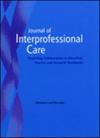Rethinking IPE duration: a five-year comparative analysis of competency development across two introductory IPE course models.
IF 1.9
3区 医学
Q3 HEALTH CARE SCIENCES & SERVICES
引用次数: 0
Abstract
Best practices have not yet been established in the interprofessional education (IPE) literature to guide the ideal dose and duration of IPE experiences across the curriculum. As such, the content, structure, and delivery format of IPE offerings vary significantly across institutions. The University of Minnesota had the rare opportunity to evaluate learner-perceived collaborative competency outcomes due to the transition of its centrally offered introductory IPE course. Data were collected consistently, longitudinally, and for a high volume of learners and professions across two IPE course models applied within the same academic institution. Retrospective analysis of pre-post interprofessional collaborative competency scores collected for over 5,000 learners from 17 health profession degree programs demonstrated nearly identical self-reported competency attainment for both a 12- and 4-hour introductory IPE offering, assessed using the ICCAS tool over the course of 5-year format transition. If student-reported competency attainment is the same following an introductory IPE experience regardless of the dosage, then academic IPE programs may be better positioned by decreasing their introductory emphasis and instead focus their resources on exploring innovative workplace-based and competency-based IPE strategies in line with contemporary recommendations. Further studies are needed to explore the implications of and next steps in this line of research.重新思考 IPE 持续时间:对两种入门 IPE 课程模式的能力培养进行为期五年的比较分析。
跨专业教育(IPE)文献中尚未确立最佳实践来指导整个课程中 IPE 体验的理想剂量和持续时间。因此,各院校提供的 IPE 课程在内容、结构和授课形式上存在很大差异。明尼苏达大学由于集中开设的 IPE 入门课程的过渡,难得有机会对学习者感知的合作能力成果进行评估。在同一所学术机构中,针对两种 IPE 课程模式的大量学习者和专业人员进行了持续、纵向的数据收集。对从 17 个卫生专业学位课程中收集的 5000 多名学生的跨专业合作能力前后评分进行了回顾性分析,结果表明,在 5 年的课程模式转换过程中,使用 ICCAS 工具对 12 小时和 4 小时的 IPE 入门课程进行评估后,学生的自我报告能力几乎完全相同。如果学生报告的能力达到情况在入门级 IPE 体验后是相同的,而不管其剂量如何,那么学术性 IPE 项目可能会通过减少其入门级重点而处于更有利的位置,转而将其资源集中在探索创新的基于工作场所和能力的 IPE 战略上,以符合当代的建议。我们还需要进一步的研究来探索这一研究方向的意义和下一步行动。
本文章由计算机程序翻译,如有差异,请以英文原文为准。
求助全文
约1分钟内获得全文
求助全文
来源期刊

Journal of Interprofessional Care
HEALTH CARE SCIENCES & SERVICES-
CiteScore
5.80
自引率
14.80%
发文量
124
审稿时长
6-12 weeks
期刊介绍:
The Journal of Interprofessional Care disseminates research and new developments in the field of interprofessional education and practice. We welcome contributions containing an explicit interprofessional focus, and involving a range of settings, professions, and fields. Areas of practice covered include primary, community and hospital care, health education and public health, and beyond health and social care into fields such as criminal justice and primary/elementary education. Papers introducing additional interprofessional views, for example, from a community development or environmental design perspective, are welcome. The Journal is disseminated internationally and encourages submissions from around the world.
 求助内容:
求助内容: 应助结果提醒方式:
应助结果提醒方式:


